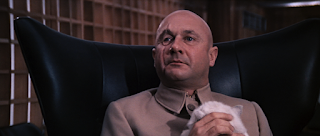The script writer (none other than children's writer Roald Dahl, the only screenplay he worked on that wasn't an adaptation of his own work) takes a lot of incidents of the book but jumbles them up. Sometimes this works; sometimes it does not. For example, the book ends with Bond missing, presumed dead-- an obituary is run for him in the Times and everything. The film moves this to the beginning: MI6 fakes Bond's death so SPECTRE doesn't know he's coming. But this doesn't really come to anything. And how can it? The whole point of Bond is that he's undercover, he doesn't run around using his own name (well, some of the time), and if SPECTRE does identify a guy as looking exactly like Bond, it doesn't seem likely they'd just shrug and say, "Oh well, that guy is dead, must be a coincidence."
So, instead of Bond investigating a weird guy living in Japan on a whim who by complete coincidence turns out to be Blofeld, here SPECTRE is kidnapping American and Soviet spacecraft from orbit and hiding them in Japan. Like a lot of Bond plots, it's dumb, but like a lot of Bond plots, it has panache. I mean, why not pluck spaceships out of orbit and hide them in a dormant volcano in Japan? I loved all of the stuff with the volcano base, which uses some modelwork to communicate scale to great effect. It has a piranha pool in it! This is stereotypical supervillain stuff, but of course this is where the stereotype starts, with the filmmakers taking the "Garden of Death" from the novel but incorporating it into Blofeld's much more cinematic plot here.
Also Bond flies around in a mini-helicopter and at one point is dumped into a pneumatic tube for no readily apparent reason.
On the other hand, he also uses makeup to look more Japanese. Uh, I don't think they would let Daniel Craig do that.
In our viewing order, this is our last Connery film, and I am sad to see him go. He was actually still trying in this one. I do really like both Craig and George Lazenby as Bond (we haven't got to any Dalton or Brosnan films yet), but Connery was the original and his physicality really recreated the character for the screen, capturing some of the blaséness of the book Bond, but giving him a ruthless charm all his own.
Other Notes:
- Donald Pleasance is the prototypical Blofeld in the pop culture imagination, but I didn't find his performance terribly memorable.
- I did like Akiko Wakabayashi as Aki, the highly competent female Japanese agent who proves a match for Bond more than once.
- There's a bit where Bond meets a contact at a sumo wrestling match. Why don't they ever use phone calls?
- On the other hand there's a hilarious bit where Bond's in a car chase, and the Japanese save him by sending a helicopter with a giant magnet to suck up the people chasing him and dump their car into the ocean. This stuff is too awesome to hate.
- This is one of a few (maybe the only?) Bond film whose action is limited to one country, fact fans!
Film Rankings (So Far):
- Casino Royale
- Dr. No
- From Russia with Love
- For Your Eyes Only
- On Her Majesty's Secret Service
- Thunderball
- You Only Live Twice
- Goldfinger
- The Spy Who Loved Me
- Moonraker
- Never Say Never Again
- A View to a Kill
- Live and Let Die
- Diamonds Are Forever














